
“There are frameworks of thought within which forgiveness can find no home. Forgiveness entered the world along with the recognition of divine and human worth . . . of rights. of duty, of guilt. It cannot occur when those are not recognized.”- Nicholas Wolterstorff, Justice in Love
“[God] has made everything beautiful in its time. He has also set eternity in the human heart; yet no one can fathom what God has done from beginning to end.”- Ecclesiastes 3:11 (NIV)
Timothy Keller concludes Chapter 3 of Forgive with the observation that the theological and cultural resources for forgiveness are diminishing in our society. Because a new and different emphasis on justice confronts the love and mercy found in forgiveness. Yet, Pastor Keller underscores, forgiveness will not disappear.
For a powerful human intuition remains about the importance and power of forgiveness. Even in a culture that rids itself of the vertical relationship with God.
Hence, Pastor Keller notes, the word the New International Version translates as eternity in Ecclesiastes 3:11 denotes endlessness or timelessness. Thus, the text means that we sense a reality that exists outside our time. Above all, we long for it.
Therefore, since we know something of eternity, we long to see the events and facts of life immersed in their full context. Consequently, Pastor Keller asks. if nothing exists beyond this world, then why do we feel:
- bothered by evil at all?
- deeply that real moral attributes exist when we tell ourselves that they don’t?
- that others deserve punishment when they violate these moral absolutes, but we desire forgiveness when we violate them?
In conclusion Pastor Keller stresses, with our intellects we may profess that life contains no meaning, no moral absolutes, and no soul. However, the author asserts, it’s not possible to live this way. Because deep down in our heart of hearts, we simply don’t believe that ‘life under the sun’ is all that exists.
Today’s question: What frameworks of thought define your understanding of forgiveness? Please share.
Tomorrow’s blog: “Not merely holy nor merely loving”

